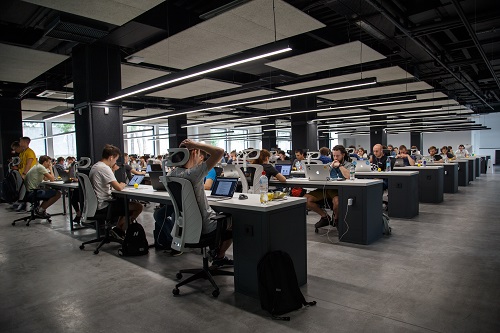Unhappy at Work? Pay Attention to the Culture
By Allison McWilliams (’95), Ph.D., Assistant VP, Mentoring and Alumni Personal & Career Development, Wake Forest University
We all, at one point or another, find ourselves unhappy at work. No job, no matter how fulfilling, makes our hearts sing every day of the week. For some, it’s a temporary thing that stems from boredom and needing a new challenge, or a dislike of a particular assignment that eventually will pass. Personally, I don’t enjoy anything having to do with budgets or end-of-year data crunching, as necessary as those tasks are. And, I know that they are short-lived tasks, and once I get through them, I can move on to other activities that I enjoy more.
For others, the feeling of unhappiness is much more pervasive. You drag into work, you dread Monday mornings, you know that you’re in a rut but you’re not sure why. And, you know you want something different, but you’re not sure what. In fact, many times our unhappiness makes it difficult to climb out of that rut, because it has such a negative impact on our mental states.
The good news/bad news scenario is that this is perfectly normal. In fact, Gallup’s research on employee engagement has found that only 13% of employees worldwide are engaged at work, a status they define as employees who “work with passion and feel a profound connection to their company. They drive innovation and move the company forward.” Everyone else falls either into the category of “not engaged” or “actively disengaged.” Think about that: a whopping 87% of employees worldwide are not engaged with their work.
Now, you may be thinking, I don’t really care about driving innovation, per se. But, engagement is a key and necessary factor in your ability to be successful and happy at work. We all want our work to connect to a sense of personal meaning and purpose. When it doesn’t, it can be easy to blame the work itself, and to think that if only you had different job duties, you would be happier. And certainly that may be one part of the problem, and it’s worth thinking about. But more often than not, the thing that causes frustration and unhappiness at work is much more about culture and leadership than it is about the daily work activities. Before you jump to the conclusion that you need to change work tasks to find satisfaction, first, take some time to pay attention to the culture.
Take a moment to think about an ideal work environment, one in which you are thriving, and challenged, and happy at work. One that doesn’t drain you on Monday mornings, but makes you excited to get to work and to get started. Don’t think about the work function or industry or specific tasks. Just think about the environment itself. Ask yourself:
- What does a “happy” work environment look like for you? How would you define or describe it?
- What do you need (resources, relationships, types of support) in order to be/do your best at work on a regular basis?
- What do you want/are you looking for from your co-workers?
- What do you want/are you looking for from your leaders/managers?
- What kind of physical work space (open office space, individual offices with doors, teleworking, bright colors, whatever) makes you most productive?
Take some time to think through these questions and write down some answers. Then, go back to your current workplace. Ask yourself: Does it (honestly) align with any of those things? And, more importantly, what does it mean for you if it does or if it doesn’t? This would be a great conversation to have with a trusted mentor to solicit some additional feedback.
No job, no workplace, no leader is perfect. And, it’s always important to recognize how you may be contributing to your own unhappiness. After all, organizational culture is created by the people who make up that organization, and that includes you. Is the culture truly toxic or destructive, or are you holding unrealistic expectations for what “work” should be? Do you contribute to a culture of gossip and negativity?
It’s also important to recognize where you sit within the organization, and what is your locus of control. Do you have the ability to influence or change the organizational culture? Are you able or willing to adapt your own behavior to align with your organization’s culture in order to be successful there? You may not be able to change the culture from where you currently sit, but you always have a choice to stay or to go, to change your own behavior or not to. Part of taking ownership for your life and your career is taking responsibility for those choices. Pay attention to the culture. It matters more than you might think.

